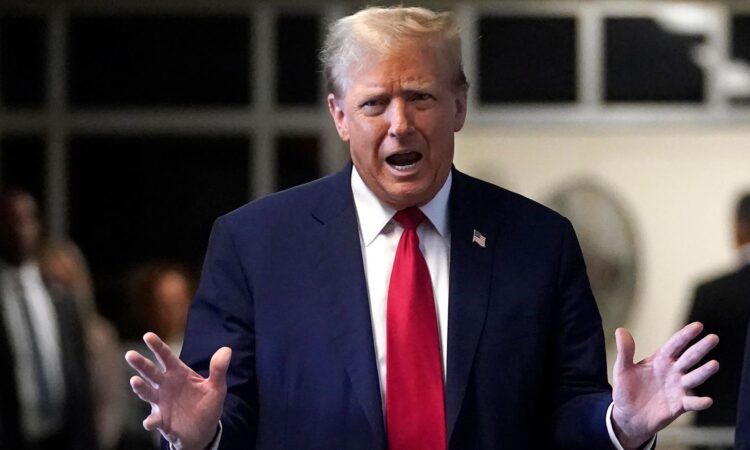
Topline
Former President Trump called the U.S. dollar’s new 34-year high against the yen a “disaster” on Tuesday, claiming it would harm U.S. manufacturers and force them to relocate plants overseas—echoing protectionist sentiments after reportedly exploring ideas about devaluing the dollar if he returns to the White House.
Trump claims the high valued currency will force U.S. manufacturers to move plants overseas.
Key Facts
In a post on Truth Social on Tuesday morning, Trump said the dollar’s new peak would be a “disaster for our manufacturers and others,” claiming it would make them “unable to compete and will be forced to either lose lots of business, or build plants, or whatever, in the ‘smart’ Countries.”
The dollar hit a 34-year high against the yen on Monday, rising to 154.85 yen versus one dollar—and is at 154.86 on Tuesday.
The former president blamed the White House for the strong dollar, claiming President Biden weakened his trade policies against China and Japan—who he said will now “pick apart the U.S.”
However, experts believe the dollar’s strength is likely related to the success of the U.S. economy compared to other nations, as well as rising inflation and the Federal Reserve’s call to delay interest rate cuts, Bloomberg reported.
Trump is exploring options to devalue the dollar if he returns to office in November in order to address the U.S. trade deficit with countries like China and Japan, Politico reported—a move widely criticized by experts who say this could also contribute to inflation and raise prices for American consumers.
Key Background
The former president claimed he enforced “limits” on China and Japan with trade policy. “When I was President, I spent a good deal of time telling Japan and China, in particular, you can’t do that,” Trump said on Monday. In 2017, Trump accused Japan of manipulating the value of the yen to hurt the U.S. economy. “They play the money market, they play the devaluation market and we sit there like a bunch of dummies,” Trump said. Chief Cabinet Secretary Yoshihide Suga called Trump’s accusation “totally inaccurate.” During his presidency, Trump also engaged in a prolonged trade war with China by enacting a 25% tariff on Chinese imports of steel, aluminum, and manufactured goods like televisions and solar panels. China responded by enacting their own 25% tariff on American goods. The trade war was eventually settled in 2020 after both sides signed a bilateral agreement, but not before it cost U.S. companies an estimated $1.7 trillion in stock prices, one study found.
Tangent
Trump is meeting with former Japanese Prime Minister Taro Aso Tuesday after his criminal trial ends for the day at 2 p.m., Reuters reported. Aso, who currently serves as the vice president of Japan’s Liberal Democratic Party, was the country’s deputy prime minister from 2012 through 2021. Japanese Foreign Minister Yoko Kamikawa said Aso’s visit was “personal activity” and not related to his government role. This is the second time Trump has hosted a world leader at Trump Tower since his hush money trial began. He hosted Polish President Andrzej Duda at the Fifth Avenue skyscraper last Wednesday. He also hosted British Foreign Secretary and former Prime Minister David Cameron at his Mar-a-Lago resort in Palm Beach, Florida shortly before the trial began.
Correction: A previous version of this story identified Yoshihide Suga as the prime minister of Japan. Suga stepped down in October 2021, and was replaced by Fumio Kishida.




